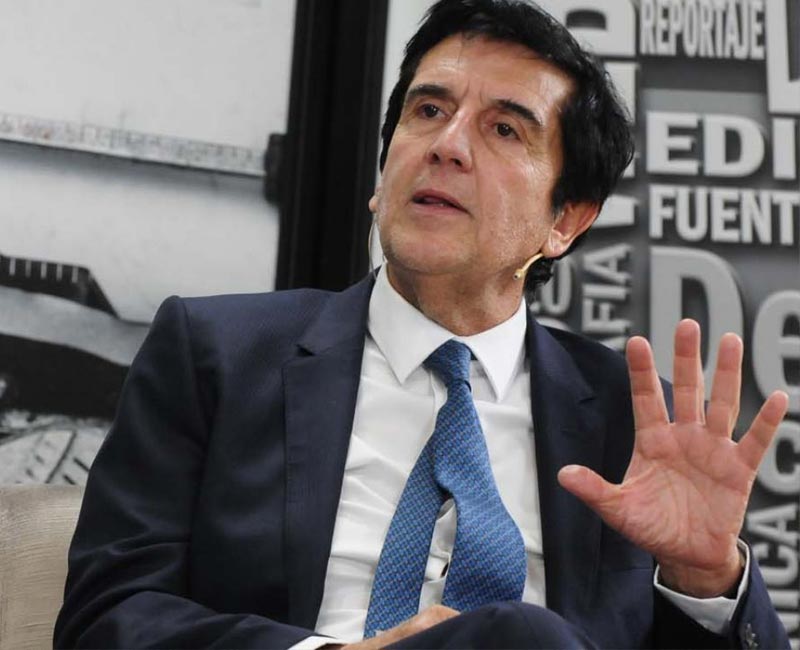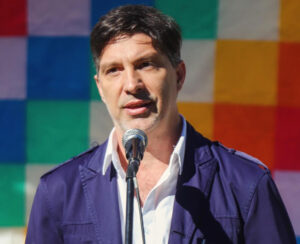
El año electoral, la inflación, las retenciones, el rol del campo y el acuerdo con el FMI aparecen entre los tópicos principales de análisis de los economistas.
La próxima edición de Expoagro se llevará a cabo del 7 al 10 de marzo en San Nicolás y reunirá a los diferentes actores de la agroindustria para ver las últimas novedades de cada uno de los rubros vinculados a la producción, al mismo tiempo que contará con espacios de exposiciones.
Este año la muestra tendrá seis auditorios donde diferentes empresas y destacados disertantes realizarán ponencias, charlas y compartirán contenidos vinculados a temas de gran relevancia y debate en el país. Entre los expositores estarán los economistas Carlos Melconian y Emmanuel Álvarez Agis. El ex presidente del Banco Nación disertará el viernes 10 a las 12 en el auditorio al aire libre Agripay, sobre las perspectivas económicas para Argentina. Mientras que el ex viceministro de Economía expondrá el jueves 9 en el mismo recinto sobre “La economía argentina y sus eternos dilemas”.
En la antesala de sus presentaciones, ambos economistas dejaron definiciones al sitio de Expoagro sobre los principales tópicos que abordarán. En referencia a la economía en el año electoral, Melconian anticipó que “estamos en una macroeconomía muy frágil, con una política incierta, pero esto no es nuevo y lo grave es que si no se toman los recaudos necesarios se va a repetir. En Argentina está demostrado -nos pasó- que los años electorales con macroeconomía frágil y política incierta terminan complicados”.
En cuanto al grado de incidencia de los factores externos en la economía nacional expresó que “hay cosas globales, que impactan a todos, como la guerra, el cambio climático, pero hay otras que son propias, son de acá, no pueden dejarse para otro momento siempre. Acá hay cuestiones que no se solucionan y se postergan”.
En la mirada del director de IERAL, lo que reflajará el escenario electoral es que “muy probablemente se siga consolidando un clima de cambio”, sosteniendo que “en la Argentina probablemente estemos asistiendo a la posibilidad de un cambio, al fin de una etapa y a una nueva oportunidad”.
Al mismo tiempo, consideró que “cualquier año electoral, en cualquier país del mundo, con cualquier tipo de gobierno, en general las políticas fiscales, monetarias, cambiarias, tienden a ser expansivas. Porque la política es así en todo el mundo, en mayor o menor medida”.
Consultado acerca del interés que puede generar el sector productivo agropecuario en el gobierno a venir, señaló que “el campo siempre es un combo, porque tiene cuestiones que refieren a la política macroeconómica, y del gobierno en particular. Además, este año nos deja como enseñanza que el campo es también hijo del clima, de los precios. Hay cosas que están al alcance de la política nacional, y otras que no, y algunas son mixtas”.
Por otro lado, Melconian explicó que desde su visión “al tipo de cambio libre y flotante desde el primer día, no vamos a ir. Porque eso fue un disparate, además de un camino de llegada”, mientras que respecto a las retenciones aseguro que no se debe generalizar ya que “hay tributaciones que están sin sentido, mientras otras son realmente importantes y no están para eliminar desde el primer día”.
Álvarez Agis, por su parte, se refirió a la importancia del sector agroindustrial en el desarrollo del país expresando que “la historia reciente del sector agroindustrial resume en buena medida el problema de la economía política argentina. Los sucesivos gobiernos no encontraron una política estable para el sector que balancee el objetivo exportador con la dinámica del mercado interno”.
En esa línea, afirmó que “es paradójico, pero mientras el anterior gobierno comenzó eliminando las retenciones y terminó reinstaurándolas, el actual comenzó subiendo las retenciones y termina bajándolas, con el dólar-soja. Es evidente que se necesita encontrar una política tributaria que permita saltar la grieta” y consideró que “esa política debería estar a mitad de camino entre los fundamentalistas del no-pago de impuestos y los fundamentalistas del otro lado”.
Para Álvarez Agis, Argentina necesita una política tributaria que maximice las exportaciones pero que al mismo tiempo proteja al mercado interno: “Una política tributaria que permita capear situaciones como la actual, con una de las peores sequías del siglo, pero que también blinde el mercado interno de eventos tales como la guerra de Rusia y Ucrania. No es una tarea sencilla, pero es central”.
Por otro lado, apuntó que en lo que va del nuevo siglo, cada vez que a Argentina le tocó atravesar por una sequía de magnitud, la actividad económica se contrajo y el peso se devaluó, por lo que remarcó que “eso no solo demuestra la centralidad del sector agroexportador para la economía argentina, sino la incapacidad de esta última de construir mecanismos de amortiguación de este tipo de eventos”.
A raíz de eso, puntualizó que lo conveniente sería “acumular divisas en épocas de vacas gordas para gastarlas en épocas de vacas flacas debería ser la versión autóctona y sostenible de la política anticíclica. Lejos de eso, hoy Argentina entra a esta sequía con una situación de reservas críticas y con la economía real empezando a pasar factura”.
Al ser consultado por la inflación, Álvarez Agis sostuvo que “es sin lugar a dudas el principal problema de Argentina y cualquier programa económico que no la tenga entre sus prioridades está condenado al fracaso”. A su vez, señaló que “sin embargo, la baja de la inflación debe ser un instrumento para alcanzar el objetivo más importante de todos: recuperar el poder adquisitivo del salario”.
En ese sentido, advirtió que “si el programa anti-inflacionario implica una retracción sobre el poder de compra de la población, lo relevante dejará de ser la consistencia técnica del plan para empezar a preguntarse sobre la consistencia social”, por lo que aseguro que “no hay chances en Argentina de configurar una baja de la inflación sostenible en el tiempo si esto no se combina con una recuperación del salario real”.
Dentro del panorama económico actual del país también se debe contemplar el acuerdo con el Fondo Monetario Internacional, al que calificó como el “error del siglo” del gobierno anterior e indicó que “el tamaño del crédito hace que deje de ser una solución para pasar a ser el principal problema de nuestra economía”, por lo que expresó que “un programa económico que pretenda bajar la inflación y recuperar el poder adquisitivo debe contemplar un acuerdo que no implique un obstáculo insalvable para la consecución de tales objetivos”.
Expoagro 2023: the main definitions of economists who will speak at the exhibition
The election year, inflation, withholding taxes, the role of the countryside and the agreement with the IMF are among the main topics of analysis of economists.
The next edition of Expoagro will be held from March 7 to 10 in San Nicolás and will bring together the different actors of the agribusiness to see the latest news of each of the items related to production, at the same time that it will have exhibition spaces.
This year the exhibition will have six auditoriums where different companies and distinguished speakers will give lectures, talks and share contents related to issues of great relevance and debate in the country. Among the speakers will be economists Carlos Melconian and Emmanuel Álvarez Agis. The former president of Banco Nación will give a lecture on Friday 10 at noon in the open air auditorium Agripay, on the economic outlook for Argentina. While the former Vice Minister of Economy will speak on Thursday 9 at the same venue on “The Argentine economy and its eternal dilemmas”.
In the prelude to their presentations, both economists gave definitions to Expoagro’s website on the main topics they will address. In reference to the economy in an election year, Melconian anticipated that “we are in a very fragile macroeconomy, with an uncertain policy, but this is not new and the serious thing is that if the necessary precautions are not taken, it will be repeated. In Argentina it has been proven -it has happened to us- that electoral years with a fragile macroeconomy and uncertain politics end up complicated”.
As regards the degree of incidence of external factors on the national economy, he expressed that “there are global things, which have an impact on everyone, such as war, climate change, but there are others that are our own, they are from here, they cannot always be left for another time. Here there are issues that cannot be solved and are postponed”.
In the IERAL director’s opinion, what the electoral scenario will reflect is that “a climate of change will most probably continue to consolidate”, maintaining that “in Argentina we are probably witnessing the possibility of a change, the end of a stage and a new opportunity”.
At the same time, he considered that “in any election year, in any country in the world, with any type of government, in general, fiscal, monetary and exchange policies tend to be expansive. Because politics is like that all over the world, to a greater or lesser extent”.
When asked about the interest that the agricultural productive sector may generate in the government to come, he pointed out that “the countryside is always a combo, because it has issues that refer to macroeconomic policy, and of the government in particular. In addition, this year has taught us that the countryside is also a child of the weather, of prices. There are things that are within the reach of national policy, and others that are not, and some are mixed”.
On the other hand, Melconian explained that from his point of view “we will not go for a free and floating exchange rate from day one. Because that was a nonsense, as well as a way of arrival”, while regarding withholdings he assured that they should not be generalized since “there are taxes that are meaningless, while others are really important and are not to be eliminated from day one”.
Álvarez Agis, on the other hand, referred to the importance of the agro-industrial sector in the development of the country saying that “the recent history of the agro-industrial sector summarizes to a great extent the problem of the Argentine political economy. Successive governments have not found a stable policy for the sector that balances the export objective with the dynamics of the domestic market”.
In this line, he stated that “it is paradoxical, but while the previous government started by eliminating withholdings and ended up reinstating them, the current one started by raising withholdings and ended up lowering them, with the dollar-soybean. It is clear that it is necessary to find a tax policy that allows to bridge the gap” and he considered that “such policy should be halfway between the fundamentalists of the non-payment of taxes and the fundamentalists of the other side”.
For Álvarez Agis, Argentina needs a tax policy that maximizes exports but at the same time protects the domestic market: “A tax policy that allows to weather situations such as the current one, with one of the worst droughts of the century, but that also shields the domestic market from events such as the war in Russia and Ukraine. It is not a simple task, but it is central”.
On the other hand, he pointed out that so far in the new century, every time Argentina has had to go through a drought of such magnitude, economic activity has contracted and the peso has devaluated, so he remarked that “this not only shows the centrality of the agro-export sector for the Argentine economy, but also the inability of the latter to build mechanisms to cushion this type of events”.
As a result, he pointed out that “accumulating foreign currency in good times to spend it in bad times should be the autochthonous and sustainable version of the anti-cyclical policy. Far from that, today Argentina enters this drought with a critical reserves situation and with the real economy starting to take its toll”.
When asked about inflation, Álvarez Agis said that “it is undoubtedly Argentina’s main problem and any economic program that does not have it among its priorities is doomed to failure”. At the same time, he pointed out that “however, the reduction of inflation must be an instrument to achieve the most important objective of all: to recover the purchasing power of wages”.
In this sense, he warned that “if the anti-inflationary program implies a retraction on the purchasing power of the population, the relevant thing will stop being the technical consistency of the plan to start asking about the social consistency”, so he assured that “there is no chance in Argentina to configure a sustainable reduction of inflation in time if this is not combined with a recovery of the real salary”.
Within the current economic panorama of the country, the agreement with the International Monetary Fund must also be considered, which he described as the “mistake of the century” of the previous government and indicated that “the size of the credit is no longer a solution but the main problem of our economy”, for which he expressed that “an economic program that intends to lower inflation and recover the purchasing power must contemplate an agreement that does not imply an insurmountable obstacle for the achievement of such objectives”.











Noticias relacionadas
La UIA apoyó el consenso para la “Ley bases” y advirtió sobre los desafíos para el empleo y las pymes
Argentina se asegura el abastecimiento de gas en invierno mediante un inédito acuerdo con Brasil y Bolivia
Milei anunciará superávit fiscal de marzo por cadena nacional